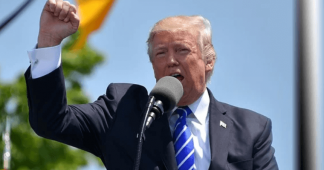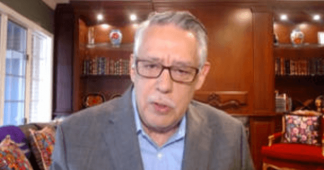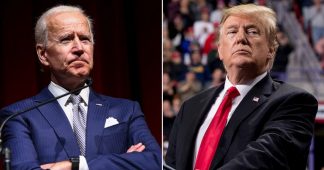November 5, 2020
Photograph by Nathaniel St. Clair
By claiming victory in the presidential election while it is still in the balance, President Trump is following what could be called “the Turkish playbook” in his determination to stay in the White House.
This approach is a rerun of the strategy employed by several populist national leaders across the world in recent years to stay in power by prematurely claiming a win at the polls, and then manipulating the final result in their favour through their control of state institutions, such as election supervisory boards and the courts.
Turkey’s president, Recep Tayyip Erdogan, is alleged to have done this successfully on several occasions, notably in the referendum that vastly expanded his presidential powers in 2017, winning a ballot that his critics say the majority had voted against.
The extent to which Trump succeeds in curtailing the counting of votes in crucial states, such as Pennsylvania, Michigan, Wisconsin and Georgia, will be a measure of the degree to which the US is on its way to becoming an “illiberal democracy” like Turkey, Poland, Hungary, India, Brazil and the Philippines.
Trump is seeking to build up momentum behind a sense that he has already won a great and inevitable victory. He benefits from a change in the political mood after exaggerated expectations were disappointed of Joe Biden winning in a landslide. Trump tried the same tactic in the mid-term elections in 2018, vigorously downplaying the extent of the Democratic successes so that it was several days before it became clear that the Democrats had, in fact, regained control of the House of Representatives.
It is not yet evident that the strategy of Biden and the Democratic Party leadership – focusing on winning back enough of their traditional voters in the midwestern states of Pennsylvania, Wisconsin and Michigan – has failed. They believed that the great mistake of an overconfident and ill-advised Hillary Clinton in 2016 was to divert attention and resources away from three traditionally Democratic states that were then lost to Trump by the hair’s-breadth margin of 80,000 votes. An overconfident Clinton had not even visited Wisconsin after her nomination.
Biden and his campaign team are being criticised for focusing too much on these states and not concentrating enough on non-white minorities, notably the Hispanic vote in Texas and Florida. At the virtual convention nominating Biden, there was not a single speaker from Texas, though Trump only won the state narrowly. Democratic activists in Georgia, still a possible Biden gain, say that they were kept short of resources.
A Biden victory is still possible, and even probable at the time of writing, but the sweeping successes that the opinion polls had predicted with some confidence never materialised. The question is, why not? The most striking feature of the vote is that the coronavirus epidemic, and Trump’s gross mishandling of it, turned out not to be the dominating issue that it had been forecast to be. Instead, it was the economy, racial differences, and law and order that were the central issues for Trump voters.
Hillary Clinton and, to a lesser degree Biden, have waited in vain for Trump to self-destruct in 2016 and 2020, but this has never happened. Instead, they made the mistake of allowing a political vacuum to develop, which he was swift to fill.
Again, this is not an uniquely American phenomenon, since an ability to dominate the news has been typical of right-wing populist leaders all over the world in the last 25 years. The earliest example of this trend is probably Benjamin Netanyahu, who first became Israeli prime minister in 1996 (losing and regaining office several times in subsequent years).
The American pundit class and probably a majority of educated Americans regard Trump with such hatred, as the man who is ruining their country, that their judgement of him is often distorted. They hope that every breath of contrary wind will capsize Trump, and the onset of the coronavirus epidemic in America early in the year appeared to be the hurricane that would do the job.
Trump’s efforts to minimise the illness appeared doomed to fail, given that 225,000 Americans had died of it, but he kept repeating that there was little to be frightened of. He dismissed lockdowns and other health measures as doing excessive damage to the economy and his argument clearly struck home.
Biden has the disadvantage of being an apotheosis of the Washington establishment, however many times he emphasises his working-class origins in Scranton, Pennsylvania. Of course, Trump’s claim to be the multi-millionaire tribune of the people is even more absurd, but he is more convincing at playing the populist card than Biden. This does not mean that he will inevitably win the election, but he has got far closer to doing so than most people imagined 24 hours ago.
Published at www.counterpunch.org











